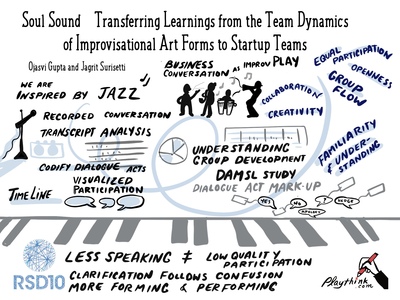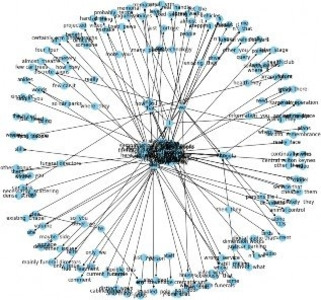Case Study: SoulSound – Transferring learnings from the team dynamics of improvisational art forms to startup teams
Gupta, Ojasvi and Surisetti, Jagrit (2021) Case Study: SoulSound – Transferring learnings from the team dynamics of improvisational art forms to startup teams. In: Proceedings of Relating Systems Thinking and Design (RSD10) 2021 Symposium, 2-6 Nov 2021, Delft, The Netherlands.
![Gupta_Soulsound_gigamap_2021.jpg [thumbnail of Gupta_Soulsound_gigamap_2021.jpg]](https://openresearch.ocadu.ca/3830/1.hassmallThumbnailVersion/Gupta_Soulsound_gigamap_2021.jpg)  Preview |
Image
Gupta_Soulsound_gigamap_2021.jpg Available under License Creative Commons Attribution Non-commercial No Derivatives. Download (824kB) | Preview |
![Gupta_SoulSound_2021.png [thumbnail of Gupta_SoulSound_2021.png]](https://openresearch.ocadu.ca/3830/2.hassmallThumbnailVersion/Gupta_SoulSound_2021.png)  Preview |
Image
Gupta_SoulSound_2021.png Available under License Creative Commons Attribution Non-commercial No Derivatives. Download (24kB) | Preview |
![Gupta_SoulSound2_2021.png [thumbnail of Gupta_SoulSound2_2021.png]](https://openresearch.ocadu.ca/3830/3.hassmallThumbnailVersion/Gupta_SoulSound2_2021.png)  Preview |
Image
Gupta_SoulSound2_2021.png Available under License Creative Commons Attribution Non-commercial No Derivatives. Download (169kB) | Preview |
Abstract
Studying and characterizing the culture in startup teams is an area of emerging interest, with stakeholders like founders, investors, government bodies and OB researchers.
In the summer of 2020, an academic project commissioned by Purdue University was conducted for the purposes of garnering automated behavioural insights that influence decision making in lean startup teams possessing complementary skill sets. This resulted in a benchmarked tool/framework that combines computational techniques like Speaker Diarization, Topic Modelling, Affect and Sentiment Recognition, and Network Graphs to analyse input data which is audio and visual in nature and outputs instances of note that help researchers model group behaviour.
A similar case study is made here for improvisational art forms like Jazz which thrive as participatory systems and depend on the positive outcomes from the development of personal and cultural forces that drive cognitive tensions/conflict.
How is a Jazz group (and other improvisational art forms) comparable to a startup team? Startups share an inherent similarity to improvisational performance art forms in their shared ownership of the outcome, flat hierarchy and diverse experience set working towards a common goal.
Link to relevant papers:
Coda—Creativity and Improvisation in Jazz and Organizations: Implications for Organizational Learning
Team dynamics: entrepreneurship versus music. What an entrepreneurial team can learn
Goals
Team dynamics and org culture come into play towards the success of an intended outcome, more so for teams with a shared goal but a loosely defined/evolving path or process to reach said goal.
The ability to improvise and co-create in a team signals for the existence of trust, mutual respect and accepted equity of the shared goal. Markers of improvisations may be different in the two systems, we aim to determine the stripped away/abstracted version of improvisation that stays true in both systems.
But is ‘team tension’ the defining characteristic in the creation of the sustainable team culture of a successful startup team and the definitive voice of a jazz group?
Given that form-and-function similarities exist at a higher level between two systems, can insights from one system be useful as learnings to the other system to achieve similar results? Can we employ cross-pollination between the two systems?
Scope
The scope of this case study is focused and limited to the connective forces built between a flat hierarchy system like a startup team and improvisational art forms like Jazz groups. This is to say those study parameters defined for either system are not transferable to other art forms or organizational systems with similar results and base assumptions.
Process
Employ previously benchmarked tools to mass-classify instances of positive/creative tension in a collaborative improvisational art performance.
Identify patterns and derivative insights from the classified instance dataset (codexed on the startup setup previously indexed) of the improvisational art performance (system under review)
Compare the expressed elements of team dynamics in a
smoothly operating/successful startup team and a similarly positioned improvisational art form team. Determine commonalities and incongruities between the two systems.
Gain feedback on results through the RSD10 conference and co-evolving the codex that classifies the expression of affect heuristics in a team setting.
Initiate a discourse on the value of using experimental AI/ML techniques to derive qualitative insights.
We aim to use literature study to understand the characteristics of improvisational performance arts that make a good reference to learn from. We then find their reflections on the startup system based on other literature studies and measurements from past work. We then validate if an improvement along these parameters lead to an improvement in the performance of the entrepreneurial team or not.
Systemic approaches employed: Social network analysis, model of concurrent design, interliminal design, praxis, hypothesis testing
Purpose of the contribution and theme: Discussing results and receiving feedback
Field and other: Systemic design, Behavioral Intelligence, Design Engineering, Affective Computing
Description
Building on our research done at Purdue University on analysing behaviour during team-based activities in organisations using computational AI/ML tools, we would like to explore learnings from improvisation in performance art forms and how it can be applied in startup systems to enhance the team viability while modulating team dynamics.
Playing with Tensions: Startup Teams are generally composed of people with complementary skill sets, competence areas and roles. Artforms like Jazz or Tango employ people of such complementary skill sets as well coming together to express their own individual voice while also bringing out the best expression of the group. This tension between individual styles and roles is a shared characteristic of both such art forms and startups and leads to commonalities that can transfer from one field to the other. Artforms such as Improvisational Comedy also highlight the need for people to wear different hats at different instances which can lead to increased complexities in opinions and flexible notions of their contributions to the team.
Why this system?
Startups share an inherent similarity to improvisational performance art forms in their shared ownership of the outcome, flat hierarchy and diverse experience set working towards a common goal.
| Item Type: | Conference/Workshop Item (Paper) |
|---|---|
| Divisions: | Faculty of Design |
| Date Deposited: | 27 May 2022 13:40 |
| Last Modified: | 27 May 2022 13:40 |
| URI: | https://openresearch.ocadu.ca/id/eprint/3830 |
Actions (login required)
 |
Edit View |

 Tools
Tools Tools
Tools